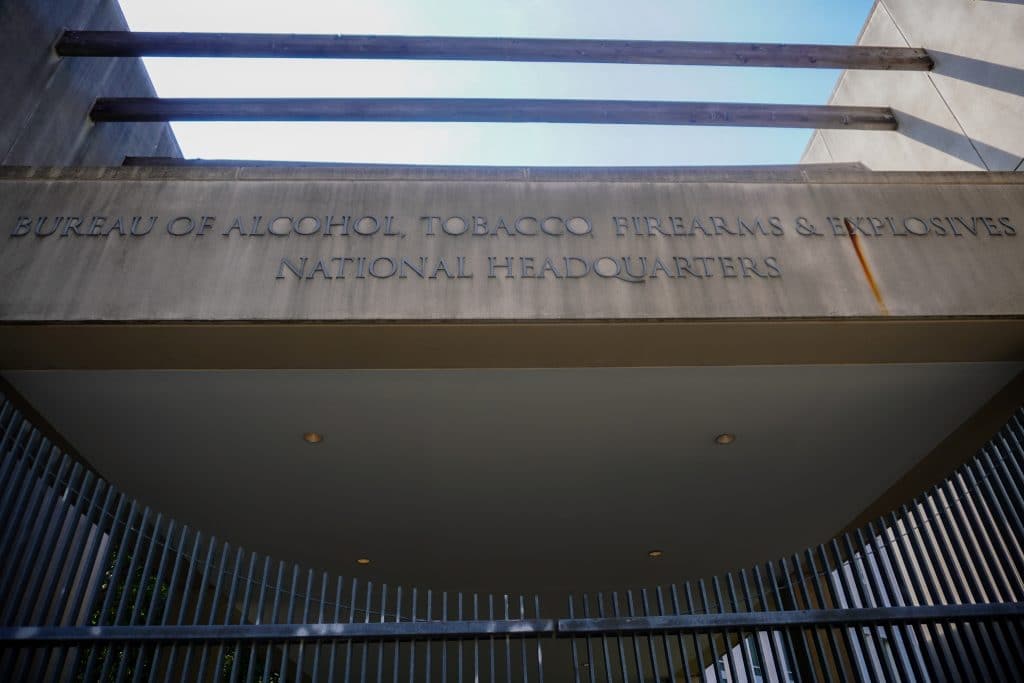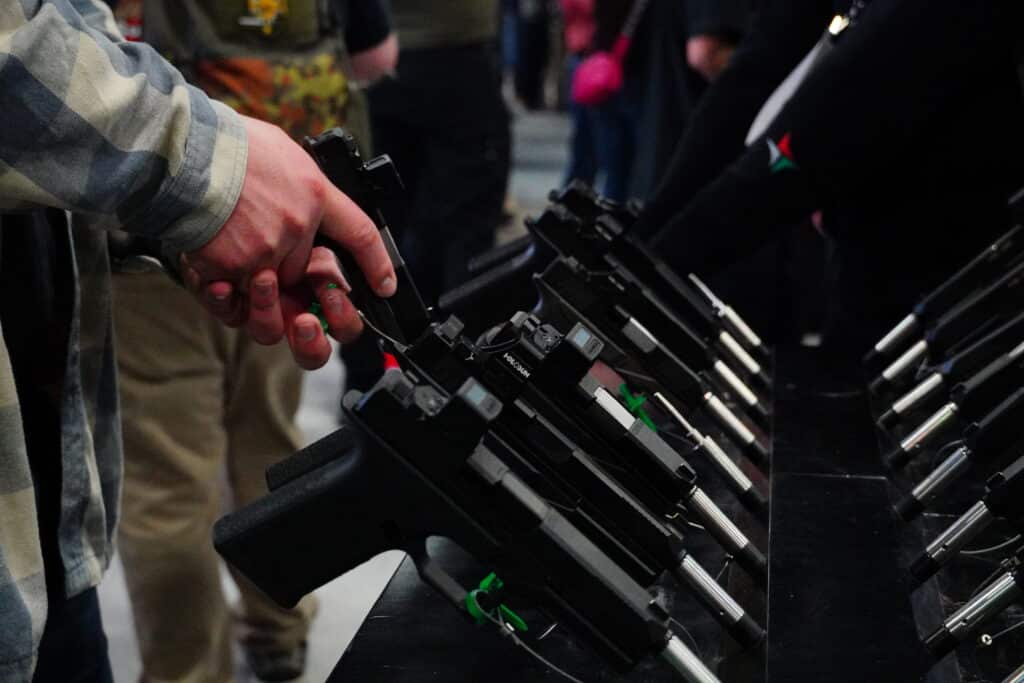The ATF released a decades-long report on gun trafficking this week. There is a lot of data to sift through, but one thing that stands out is how rare it is for a licensed gun dealer to be involved in trafficking.
Just 1.6 percent of cases the ATF examined during a five-year period implicated a Federal Firearms Licensee (FFL), a significant decline from the last time the ATF did a report like this. As Contributing Writer Jake Fogleman explains, that undermines one of President Joe Biden’s key gun initiatives.
It wasn’t all good news for the gun industry this week, though. Gun sales were down for the third month in a row. That should be concerning given how long the hangover from pandemic-era record sales has lasted and the fact that even a presidential election featuring a candidate calling for an “assault weapons” ban hasn’t motivated buyers.
Plus, gun-rights lawyer Matt Larosiere joins the podcast to explain why he believes the Second Amendment applies to nearly everyone in the US–even those here unlawfully. That topic has been one of our most-viewed this year. So, it seemed like a good idea to get a bit more in-depth on the topic.

Analysis: ATF Report Suggests Licensed Gun Dealers Aren’t Fueling Black Market Sales [Member Exclusive]
By Jake Fogleman
A new ATF report undermines the Biden administration’s rationale for cracking down on gun dealers.
On Thursday, the ATF released Volume Three of the National Firearms Commerce and Trafficking Assessment. The report, the first comprehensive analysis of criminal gun trafficking by the agency since 2000, examined over 9,700 ATF firearm trafficking investigations between 2017 and 2021 to create a picture of the most common sources of black-market firearms.
It found sales by unlicensed private sales and straw purchases represented just over 80 percent of all cases. Stolen firearms accounted for another quarter of the trafficked guns.
On the other hand, the report identified just 136 cases of illegal trafficking by Federal Firearms Licensees (FFLs). That represents 1.6 percent of cases during the five-year period.
The agency said those numbers represented a sharp decline from the previous report.
“The data analyzed in this report indicates that a shift in the types of trafficking channels used over the course of the last two decades has occurred,” a summary of the report reads. “Corrupt FFL investigations represented almost 9% of trafficking investigations in the 2000 report, but now represent less than two percent of trafficking investigations.”
The picture painted by the report stands in contrast to the one President Joe Biden has presented since taking office. He has repeatedly warned of the dangers of “rogue gun dealers” and instituted a more adversarial approach to the gun industry, including a “zero-tolerance” policy that has dramatically increased the number of license revocations under his tenure.
Biden announced the new policy in June 2021, intending to stem the flow of guns into criminal hands. It directed the ATF to begin revoking FFLs for single violations of federal law, with a particular emphasis placed on dealers found to be “willfully transferring a firearm to a prohibited person, failing to run a required background check, falsifying records, such as a firearms transaction form, failing to respond to an ATF tracing request, or refusing to permit ATF to conduct an inspection in violation of the law.” It also allowed the agency to revoke licenses for other perceived violations of federal law not explicitly included in that list.
The ATF’s new report shows that special scrutiny on licensed gun businesses is likely misplaced.
According to the agency, there were 134,516 active FFLs by the end of 2021. So, the ATF only suspects around 0.1 percent of FFLs may have been involved in illegal trafficking in the lead-up to the President’s zero-tolerance policy. Furthermore, the agency’s report confirmed that its suspicions of the industry’s involvement in criminal gun trafficking were already on a downward trend from previous decades, even as the period studied covered the most significant surge in gun buying in US history.
That extra scrutiny has also come at the expense of strained relations between the firearms industry and the ATF. Almost immediately after Biden enacted the zero-tolerance policy, the industry and its allies began complaining that licenses were being revoked for clerical errors and other minor infractions by agents using, at times, controversial enforcement tactics.
“Previous to the Biden administration, minor clerical errors found during inspections were annotated for corrective action with ATF inspectors instructing firearm retailers on how to stay within regulations and laws,” Larry Keane, General Counsel for the National Shooting Sports Foundation (NSSF), wrote in a February post. “That’s no longer the case. Instead of using the ATF as a government bureau to assist the firearm industry to stay within regulations, President Biden and his ATF have turned it into a steel trap by which they snare firearm retailers to run them out of business.”
FFL revocations have steadily ramped up each year since the President put the directive in place. The ATF revoked 157 licenses in 2023, 88 licenses in 2022, and five in the last six months of 2021. Another 173 FFLs have since voluntarily surrendered their licenses over the same time.
Some of the revocations were for conduct that contributed to illegal firearms trafficking. However, revocation documents published by the ATF also include numerous cases where there was no evidence the dealers intentionally committed violations or that their actions led to firearms being used in crimes. Several revocations show dealers made paperwork errors or accepted gun-carry permits in lieu of a background check to make a sale without understanding the exception doesn’t apply to out-of-state permits.
So, even as the President’s crackdown on licensed firearms dealers continues apace, his administration’s research shows that effort is unlikely to put a meaningful dent into illegal gun trafficking.
Podcast: A Gun-Rights Lawyer Argues Second Amendment Protects Illegal Immigrants [Member Early Access]
By Stephen Gutowski
This week, we’re discussing a hotly debated topic: the gun rights of illegal immigrants.
A federal judge’s recent ruling that the law disarming a defendant who is in the country unlawfully, but who doesn’t have any violent convictions, violates the Second Amendment has drawn a lot of attention. It has been one of our most trafficked stories at The Reload this year. The same is true for the dueling analysis pieces we published examining the ruling’s legal theory and where the Supreme Court might come down on the issue.
Given the discussion surrounding all of this, it seemed like a good idea to take a deeper dive into the topic. That’s why we asked gun-rights lawyer Matt Larosiere, who wrote one of those analysis pieces for us, to come on the show. He gave us a fuller explanation of why he believes the Second Amendment protects nearly all people in the United States, regardless of their immigration status.
He argued the modern gun prohibition based on immigration status shouldn’t be able to withstand the Supreme Court’s Bruen test because the Founders didn’t view citizenship the way we do today, and the Second Amendment’s language is better read to protect nearly anyone in the country. He said reading the amendment to exclude those who aren’t part of the political community doesn’t work because the average American wasn’t allowed to vote or participate in other key political functions during the Founding Era. Yet they did have their gun rights protected.
He also argued that denying gun rights to immigrants in the country unlawfully, which is only a misdemeanor, necessitates adopting a legal standard that would put everyone else’s gun rights at risk. Still, Larosiere acknowledged the recent ruling is an outlier and the Supreme Court is unlikely to take up a similar case anytime soon. But he argued gun-rights proponents should embrace the ruling and the logic that led to it.
You can listen to the show on your favorite podcasting app or by clicking here. Video of the episode is available on our YouTube channel. An auto-generated transcript is available here. Reload Members get access on Sunday, as always. Everyone else can listen on Monday.
The news update, which we now publish separately to get it out to you guys a bit faster, is also available. Audio is here, and video is here. Contributing Writer Jake Fogleman and I examine why gun sales have declined through the first three months of 2024.

Analysis: Why Haven’t Gun Sales Rebounded? [Member Exclusive]
By Stephen Gutowski
The first three months of 2024 saw gun sales fall behind the same period last year in a surprising reversal of fortunes for the industry. Why has it happened, and what does it mean?
March 2024 saw 1.4 million gun sales, according to an industry analysis of background checks. That sounds like a lot, and it is. But it’s actually down 7.4 percent from March 2023, which was itself down from March 2022, which was down from March 2021, which was down from March 2020.
January and February’s numbers tell the same story.
The gun market is still searching for a floor after pandemic-era highs. It’s now a search well into its fourth year. Each time the market appears to stabilize, a few months go by, and the bottom drops back out.
Sales rose at the end of 2023, but they’ve fallen back down and are now even below pre-pandemic levels.
The latest reversal is more surprising because we’re now headed into an election. The presidential election should be driving more sales, especially since the incumbent is running on instituting a sales ban on popular guns. Traditionally, gun sales have increased in election years.
Even this early in the campaign, previous election years have tended to see elevated sales levels. The year-over-year increase during national elections is evident in 2020, 2018, 2016, 2012, 2008, and 2004.
Certainly, That’s not every election year. But it’s most. And the elections that saw a decrease in year-over-year March gun sales were ones preceded by a year that experienced a huge spike in demand, such as the 2013 buying spree inspired by concerns over new gun bans in the aftermath of the Sandy Hook shooting.
The perfect storm of chaotic events Americans experienced in 2020, with a collection of controversies and emergencies that motivated people from all backgrounds to buy guns, led to the ultimate sales spike. So, part of the decline can still be chalked up to the expected hangover from that unprecedented buying spree. But four years on, and with March sales dropping below 2018 and 2013 levels, there is probably something more going on.
After all, there’s been a lot of good evidence from industry and academic sources that millions of people bought guns for the first time during that pandemic surge. Sure, the 2024 election alone is unlikely to drive sales back to 2020 levels, but you’d expect it should put them above last year’s numbers. And, indeed, above the numbers from before millions of people were added to the gun-owning community.
So, why hasn’t that happened?
The economic situation could be having an effect. Inflation has raised the prices of guns and ammo. People’s wages haven’t always kept up with that change.
Although, the economy seems to be doing better than the last year or two. Consumer spending and consumer confidence have remained high through the beginning of the year. Americans’ views of the economy have also begun to brighten.
Guns are, of course, also a durable good. They don’t wear out as long as they are properly maintained. Theoretically, one is enough to address the average person’s safety concerns.
It’s possible all those new pandemic-era gun owners aren’t adding to their gun collections at the same rate pre-pandemic owners traditionally have. So, overall, the average demand for guns may have fallen a bit. Those who were inclined to buy a gun for self-defense did so during the pandemic, and they may well be satisfied with what they’ve already got.
The gun industry may not have converted them into repeat buyers as successfully as traditional owners. Plus, those traditional owners may have stockpiled enough during the 2020 surge that they, too, feel less inclined to go out and buy more for a good long while. Maybe they have all the AR-15s, AK-47s, or other guns targeted by legislative ban proposals that they feel like they need, and the threat of a ban is not as much of a motivator anymore.
It’s hard to say for sure.
Another possibility is that Americans may not be paying attention to the election yet. News site traffic and cable ratings are way down from the same time in 2020. In fact, like gun sales, news interest seems to be down even over last year.
That means the kind of gun buyer who might buy an AR-15 or similar gun because they’re concerned about President Joe Biden’s continued push for an “assault weapons” ban may not be paying attention to the news to become concerned yet. Same for a gun buyer concerned about where another Trump term could take the country. Or for whatever other buyers might head to their local gun store over the politics of the moment.
Maybe the people who are going to be persuaded to buy a gun over the election are still tuning out political news at the moment.
Or, perhaps they do understand what’s going on and are simply not very alarmed by the 2024 election. That might even be a good sign. After all, gun sales spikes tend to be something of a chaos indicator.
The more uncertain Americans view the future, the more threatened they feel, the more likely they are to buy guns. So, a sales decline like the one we’re seeing could indicate people are not very worried about where things are headed. They may not be concerned about new gun bans passing, violence increasing in their neighborhood, or political upheaval boiling over throughout the country. Or they may feel they’re already prepared for those potential outcomes.
There are some good reasons to feel that way after all. More than half of American voters now report having a gun in the home, according to an NBC poll. The Supreme Court handed down a landmark ruling expanding their view of what the Second Amendment covers just two years ago. President Biden, who is running basically even with Trump at the moment, appears unlikely to hold the Senate even if he does win and try to pass an AR-15 ban.
Maybe these are some of the things tempering the demand for guns. Maybe we’ve just reached peak gun, and demand will never get close to those pandemic levels again. Maybe we’ll see sales pick back up as the election gets closer and people start paying closer attention to it. Maybe it’ll happen as the economy continues to improve.
Sales rising as November inches closer would be in line with how the gun market’s demand cycle, but that should have already started. So, it’s hard to say what exactly lies ahead.
That’s it for now.
I’ll talk to you all again soon.
Thanks,
Stephen Gutowski
Founder
The Reload








